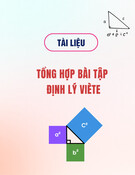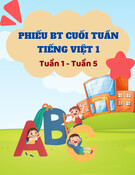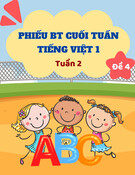
1
Tài liệu Kiến thức cơ bản
Tiếng Anh 10
Trường THPT Đào Sơn Tây
Lớp: 10A…
Họ và tên:…………………………..
Năm học 2021 - 2022

2
UNIT 1 – A DAY IN THE LIFE OF…
VOCABULARY
1. alarm (n) đồng hồ báo thức, chuông báo động
alarm (v) làm ai hoảng hốt
2. bank (n) bờ
3. boil (v) đun sôi, luộc
4. buffalo (n) con trâu
5. chat (v) nói chuyện phiếm (~ talk in a friendly way)
- chat (n) cuộc nói chuyện phiếm
6. content (v) làm ai hài lòng
- contented (a) hài lòng (~happy and satisfied)
7. crop (n) mùa vụ
8. fellow (n, a) bạn đồng nghiệp
9. go off (v) reo chuông, nổ
10. harrow (v) bừa
- harrow (n) cái bừa
11. lead – led – led (v) dẫn dắt
- leader (n) người lãnh đạo
12. local (a) thuộc địa phương
- locally (adv) mang tính địa phương
13. neighbor (n) hàng xóm
- neighborhood (n) khu phố, xóm
14. peasant (n) nông dân
15. plot (n) thửa đất (~ plot of land)
16. plough (v) cày
- plough (n) cái cày
17. pump (v) bơm
- pump (n) cái bơm
18. rest (v) nghỉ ngơi
- rest (n) thời gian nghỉ ngơi
19. tobacco (n) thuốc lá
20. transplant (v) cấy ghép
transplantation (n) việc cấy ghép
transplanting (n) việc cấy lúa
GRAMMAR
1. Simple present (Hiện tại đơn)
(+) S + V1/s/es
(-) S + don’t/doesn’t + V1
(?) (Wh-) + do/does (not) + S + V1?
Cách dùng
a. Diễn tả thói quen và hành động lặp đi lặp lại trong hiện tại
b. Diễn tả chân lí
Trạng từ thường gặp: never, sometimes, usually, often, always, as a rule, normally…
Ví dụ: Mr Vy usually gets up at 4:40 a.m.

3
The sun rises in the east.
2. Adverbs of frequency (Trạng từ thường xuyên)
Trạng từ thường xuyên always, normally, usually, frequently, often, sometimes, occasionally,
rarely, seldom, hardly ever, never, ever… được đặt trước động từ chính, đặt sau động từ “be”. Khi
trong câu có hai/ ba trợ động từ, trạng từ được đặt sau trợ động từ thứ nhất. Các trạng từ sometimes,
usually, normally, frequently, often và occasionally có thể đứng đầu câu hoặc cuối câu.
Ví dụ: Mr. Lam is always on time.
3. Simple past (Quá khứ đơn)
(+) S + V2/ed
(-) S + didn’t + V1
(?) (Wh-) + did (not) + S + V1?
Cách dùng: Diễn tả hành động đã xảy ra và hoàn tất trong quá khứ
Trạng từ thường gặp: yesterday, ago, last, in (2000)…
Ví dụ: Kate finished high school in 2004.
EXERCISES
I. Choose the word whose underlined part is pronounced differently from that of the other
three:
1. a. routine b. big c. hit d. live
2. a. driver b. driven c. district d. miss
3. a. smile b. fire c. typical d. ride
4. a. beat b. head c. eaten d. meat
5. a. cheap b. pea c. leave d. peasant
II. Choose the word which has a different stress pattern from that of other three:
1. a. typical b. tobacco c. national d. buffalo
2. a. ready b. kitchen c. dinner d. prefer
3. a. unfortunately b. immediately c. nationality d. occasionally
4. a. geography b. technology c. education d. biology
5. a. afternoon b. continue c. beginning d. expression
III. Choose the best answer:
1. The alarm goes off at 4:30.
a. tells b. rings c. wakes d. shakes
2. We are contented with what we do.
a. satisfied with b. excited about c. interested in d. afraid of
3. It takes me 45 minutes to get ready.
a. go b. think c. prepare d. watch
4. She purchased a number of shares in the company.
a. invested b. sold c. exchanged d. bought
5. We had a nice chat over a cup of tea.
a. formal talk b. informal talk c. serious talk d. long talk
6. I have a busy timetable this weekend.
a. schedule b. subject c. discussion d. job
7. The alarm goes ______________ at 4:30.
a. of b. off c. in d. on

4
8. We are contented ____________ what we do.
a. with b. to c. in d. of
9. Then my husband pumps water _________ the field.
a. in b. on c. into d. at
10. What time does Quan have a Civic Education lesson ________ Monday?
a. on b. in c. at d. of
11. I continue to work ________ a quarter past eight _________ 10:30.
a. from - and b. from - at c. at - at d. from - till
12. After Mr. Lam gets up, he rides his cyclo _________ District 1 ____ District 5.
a. from - to b. from - until c. from - in d. in - in
13. On that day, I stares death ______ the face.
a. on b. in c. at d. to
14. We realized we were _____ danger.
a. at b. in c. on d. at
15. Many people scream _____ panic.
a. on b. at c. to d. in
16. After taking off, the plane slowly _________ height.
a. took b. dreamed c. gained d. drove
17. The police are looking for any information that may _________ to the arrest of the bank robbers.
a. find b. look c. lead d. have
19. It was the most ____________ experience of my life.
a. frighten b. frightening c. frightened d. frightful
20. __________ channels are there on our __________________ TV?
a. How much/ nation b. How many/ nation
c. How much/ national d. How many/ national
21. I am not ____________ in fishing.
a. interested b. interest c. interests d. interesting
22. I usually drink __________ cups of tea in the morning.
a. much b. lot of c. a d. several
24. We ___________ have English on Monday, Tuesday and Friday.
a. usual b. frequent c. usually d. normal
IV. Read the passage carefully, then choose the correct answer:
At home in the morning — I am a student. So I spend the day in a simple way. I get up from bed
early in the morning. First, I do my morning duties. I wash my face and brush my teeth. I take great care
of my teeth, because bad teeth are a sign of bad health. Then I take a little physical exercise. After taking
exercise I go out for a walk in the open field. There I breathe pure morning air. My mind and body are
both refreshed. Then I return home. I say my short prayer.
1. What does the speaker do?
a. He is a teacher. b. He is a student. c. He is a singer. d. He is a model.
2. After getting up, what does he do first?
a. He breathes pure morning air. b. He does his morning duties.
c. He went back to sleep. d. He does exercise.
3. Why does the speaker go out for a walk?
a. Because he wants to breathe pure morning air.
b. Because he wants to relax.
c. Because he wants to meet his friends.

5
d. Because he wants to do morning exercise.
4. Where does the speaker go out for a walk?
a. On a river. b. In the park. c. In the garden. d. In the open field.
5. What does he do after returning home?
a. He has breakfast. b. He takes great care of his teeth.
c. He says his short pray. d. He washed his face.
V. Choose the best answers:
1. My friend_____________ to the museum last weekend.
a. goes b. went c. had gone d. have gone
2. Our Singaporean friends_______________ to visit our school last year.
a. is coming b. come c. came d. have come
3. We_____________ Malaysia last summer.
a. visited b. were visiting c. are visiting d. have visited
5. The beans and the meat _________ quite cheap.
a. are b. is c. is being d. are being
6. He usually ___________ up at 6 a.m.
a. get b. got c. has got d. gets
8. In the past, most peasant farmers ___________ enough to feed themselves.
a. didn’t earn b. earns c. didn’t earned d. don’t earn
9. Spring ________ winter.
a. is following b. follows c. was following d. has followed
10. The nurse __________ her parents every day.
a. visits b. is visiting c. will visit d. visited
11. We __________ card games every week.
a. plays b. play c. have played d. are playing
12. Food ___________ you energy.
a. gave b. give c. gives d. has given
13. I ______________ see my cousins.
a. don’t often b. often don’t c. doesn’t often d. often doesn’t
14. The earthquake _______________ in 1905.
a. happen b. is happening c. happens d. happened
15. We ______ to the clubs every weekend when we were at college.
a. have gone b. are going c. went d. go
16. My girlfriend _____________ dancing.
a. is liking b. likes c. are liking d. like
17. Ngoc and Phuong _______________ badminton twice a week.
a. play b. plays c. are playing d. played
18. How many periods a week does he have?
a. three b. at 7 a.m. c. English d. at the library
VI. Writing:
Give the correct form of the words.
1. Then my husband pumps water into it while I do the __________________. (TRANSPLANT)
2. Sometimes we go and see our ________________ for a cup of tea. (NEIGHBORHOOD)
3. Although it’s a long day for us, we are ______________ with what we do. (CONTENT)
4. I had a _______________ holiday until the fire. (WONDER)
Make questions for the following sentences.



![Tài liệu tham khảo Tiếng Anh lớp 8 [mới nhất/hay nhất/chuẩn nhất]](https://cdn.tailieu.vn/images/document/thumbnail/2025/20250806/anhvan.knndl.htc@gmail.com/135x160/54311754535084.jpg)










![Phiếu bài tập cuối tuần Tiếng Việt 1 tuần 2 đề 2: [Hướng dẫn chi tiết]](https://cdn.tailieu.vn/images/document/thumbnail/2025/20250728/thanhha01/135x160/42951755577464.jpg)

